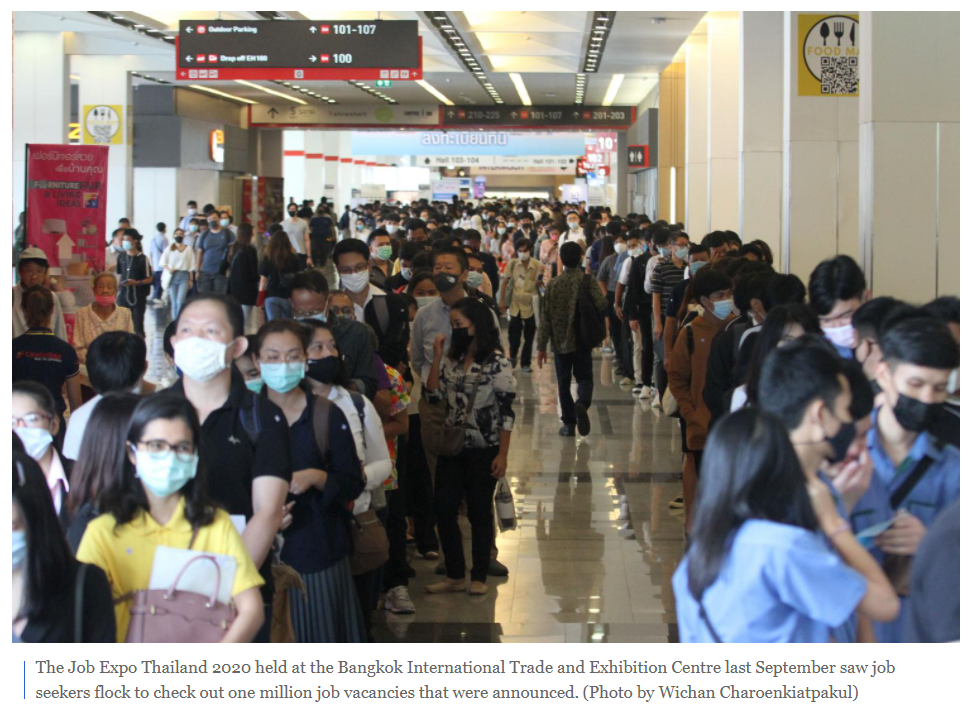Thailand: Resurgence threatens shoots of recovery
The labour market was just starting to bounce back with a lower-than-expected unemployment rate when the fresh wave of Covid-19 cases hit, says Deputy Chairman of the Thai Labour Solidarity Committee (TLSC), Chalee Loysoong.
Continued assistance will be needed for recent graduates and workers in the most affected industries as the government shapes its response, he said.
In an interview with the Bangkok Post, Mr Chalee said 2020 had been a hard year for workers who had to survive both Covid-19 and the risk of layoffs. Many companies cut employee numbers through voluntary early-retirement programmes for those aged over 45 years old.
“In the past year, many companies turned the Covid-19 crisis into an opportunity to shake up their structure. [That said,] despite the voluntary retirements and resignations, some were still forced to lay off employees,” Mr Chalee said.
Nevertheless, the labour sector managed to survive the pandemic. The automotive, electrical appliances, food and export sectors were all doing well as the last wave of infections broke late last year, he said.
According to the Social Security Office, 327,693 employees were let go in 2020 with the highest number losing their jobs in August. Around 1.14 million people filed for unemployment benefits, 763,629 of whom had voluntarily resigned.
The office paid out 14.99 billion baht to 945,191 people who filed for unemployment specifically related to Covid-19 at a rate of 62% of their salary.
Meanwhile, chairman of the Federation of Thailand Automobile Workers’ Union, Lare Yupensuk, said the automotive sector had not yet felt the impact of the new coronavirus outbreak. Orders began to rise again last September after the number of cases dwindled and most restrictions were lifted, he added.
As long as there is no lockdown to contain the virus this year, Mr Lare said he believed auto manufacturers would be able to resume normal production.
In terms of the impact of the virus on the overall labour market and economy, Assoc Prof Kiriya Kulkolkarn, of Thammasat University, said businesses had started to recover in the fourth quarter of 2020 before the latest round of positive tests in mid-December.
However, domestic spending has dropped since then despite the government’s measures to stimulate spending such as the “Khon La Khrueng” (“Let’s Go Halves”) co-payment programme and We Travel Together programme, she said.
She was nevertheless optimistic about the prospects of the economy, saying she believed consumers would begin to spend once the virus was brought under control again.
She suggested the government could provide even more targeted assistance to those in the worst-hit sectors this time round.
Assoc Prof Kiriya also called on the government to urgently help vulnerable groups such as the self-employed, new graduates, SMEs and communities who are feeling the virus’ impact just as much as workers.
The unemployment rate, which has been pegged at about 2%, or 700,000 people, was not as high as previously thought, she said.
However, she did express concerns about how the figure was achieved — saying many companies managed to avoid laying off employees by cutting their staff’s working hours, which also effectively brought down their income.
“All sides need to work together to move the economy forward after Covid-19,” Assoc Prof Kiriya said.
Skills should be developed to reroute the workforce into the fields of electric vehicles, the environment and tourism, she said.
Noey, a 45-year-old factory worker, said her factory had laid everyone off in mid-2020. Most were in their 40’s, but she was lucky that her husband still had a job to provide for the family.
She said she was trying to a find a new job but most of the vacancies put an age cap of 35 on their intake, so she has been forced into selling goods, both at markets and online, to help provide for their three-year-old and nine-year-old daughters.
“I did not even get my unemployment insurance because my employer said it was the employees’ fault,” she said.
Noey wasn’t the only one in that predicament.
In late July 2020, a manufacturer of women’s lingerie and swimsuits in Nakhon Sawan province laid off 800 employees and refused to surrender to their demands for unpaid salaries and compensation, instead claiming they had all been let go due to underperformance and mistakes they had made.
The total in unpaid salaries and compensation amounted to 97 million baht. The Labour Court is considering the workers’ complaint against the factory.
Labour Minister Suchart Chomklin said the ministry was aware of the impact of the pandemic on workers, and said he and his team had launched a project to develop skills for those made unemployed so they could find a new job more easily, he said.
Over 500,000 people were hired at the ministry’s job expo 2020 in September, during which 330,000 found a new job at government agencies, 160,000 received job offers from private companies and around 10,000 secured roles abroad.
According to the minister, over 870,000 insured Thai individuals under the Social Security Act’s Section 33 filed for unemployment benefits from April to November last year.
Of those, 170,000 have returned to the social security system — which means they have found a new job.
Mr Suchart said there was a marked increase in the number of people insured under the scheme, which was a positive sign.
It had risen year-on-year from December 2019 to December 2020, meaning overall, there were more people in gainful employment, he said.
Source: https://www.bangkokpost.com/business/2048727/resurgence-threatens-shoots-of-recovery


 English
English




